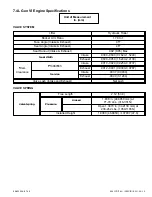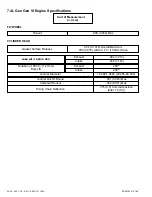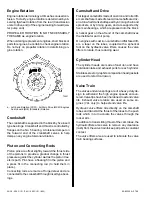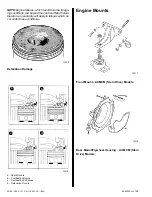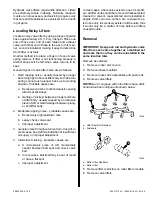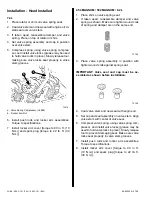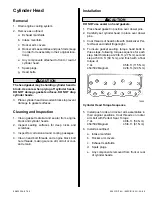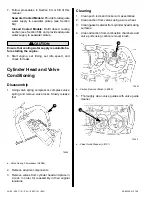
90-823224--2 796
454 CID (7.4L) / 502 CID (8.2L) - 3A-19
Piston Failures
Pre-Ignition
Pre-ignition is abnormal fuel ignition, caused by com-
bustion chamber hot spots. Control of the start of igni-
tion is lost, as combustion pressure rises too early,
causing power loss and rough running. The upward
motion on the piston is opposed by the pressure rise.
This can result in extensive damage to the internal
parts from the high increase in combustion chamber
temperature.
72424
Pre-Ignition Damage
72314
a
b
c
d
a - Ignited By Hot Deposits
b - Regular Ignition Spark
c - ignites Remaining Fuel
d - Flame Front Collide
PRE-IGNITION CAUSES
1. Hot spots in the combustion chamber from glow-
ing deposits (due in turn to the use of improper
oils and/or fuels).
2. Overheated spark plug electrodes (improper
heat range or defective plug).
3. Any other protuberance in the combustion cham-
ber, such as an overhanging piece of gasket, an
improperly seated valve or any other inadequate-
ly cooled section of material which can serve as
a source.
Engine failures, which result from the foregoing con-
ditions, are beyond the control of Mercury Marine;
therefore, no warranty will apply to failures which oc-
cur under these conditions.
Detonation
Detonation, commonly called “fuel knock,” “spark
knock” or “carbon knock,” is abnormal combustion of
the fuel which causes the fuel to explode violently.
The explosion, in turn, causes overheating or dam-
age to the spark plugs, pistons, valves and, in severe
cases, results in pre-ignition.
Use of low octane gasoline is one of the most com-
mon causes of detonation. Even with high octane
gasoline, detonation could occur if engine mainte-
nance is neglected.
OTHER CAUSES OF DETONATION
IMPORTANT: Use of improper fuels will cause en-
gine damage and poor performance.
1. Over-advanced ignition timing.
2. Lean fuel mixture at or near full throttle (could be
caused by carburetor or leaking intake manifold).
3. Cross-firing spark plugs.
4. Excess accumulation of deposits on piston and/
or combustion chamber (results in higher com-
pression ratio).
5. Inadequate cooling of engine by deterioration of
cooling system.









